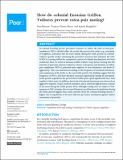Por favor, use este identificador para citar o enlazar a este item:
http://hdl.handle.net/10261/177823COMPARTIR / EXPORTAR:
 SHARE SHARE
 CORE
BASE CORE
BASE
|
|
| Visualizar otros formatos: MARC | Dublin Core | RDF | ORE | MODS | METS | DIDL | DATACITE | |

| Título: | How do colonial Eurasian Griffon Vultures prevent extra-pair mating? |
Autor: | Bertran, Joan; Macià, Francesc Xavier; Margalida, Antoni CSIC ORCID | Palabras clave: | Copulations Extra-pair mating Colonial species Vulture Sperm competition |
Fecha de publicación: | 2016 | Editor: | PeerJ | Citación: | PeerJ 4: e1749 (2016) | Resumen: | In colonial breeding species, preventive measures to reduce the risks of extra-pair copulations (EPCs) should reflect the actual risk perceived by males (e.g., proximity of neighbors, intrusions into the nest) mainly during the fertile period. In colonial vultures, specific studies examining the preventive measures that minimize the risks of EPCs occurring within the competitive context of colonial breeding have not been conducted. Here we tested at Eurasian Griffon Vulture (Gyps fulvus) nesting sites the intensity of paternity assurance behavior, shown as frequency and duration of within-pair copulations (WPCs), potential mate vigilance or nest attendance, and levels of aggressivity. This was measured according to the frequency of territorial intrusions and comparison of the fertile vs. the non-fertile period. Our findings suggest that the frequency of WPCs and their duration increased significantly during the presumed fertile period, regarded as the period when Griffon pairs spent significantly more time together at their nests. In addition, low levels of territorial intrusions were observed, an aggressive response of pairs towards intruders, and a relatively high presence of pairs at the nests during the fertile period. Thus, although nesting sites are subject to low exposure to EPC attempts, the increased frequency and duration of copulations during the fertile period suggests that, under pressure from the colonial breeding system, a higher rate of copulations is the most effective preventive mechanism against relative uncertainty of paternity. | Versión del editor: | https://doi.org/10.7717/peerj.1749 | URI: | http://hdl.handle.net/10261/177823 | DOI: | 10.7717/peerj.1749 | E-ISSN: | 2167-8359 |
| Aparece en las colecciones: | (IREC) Artículos |
Ficheros en este ítem:
| Fichero | Descripción | Tamaño | Formato | |
|---|---|---|---|---|
| extra-pair.pdf | 382,04 kB | Adobe PDF |  Visualizar/Abrir |
CORE Recommender
PubMed Central
Citations
3
checked on 05-may-2024
SCOPUSTM
Citations
7
checked on 28-abr-2024
WEB OF SCIENCETM
Citations
6
checked on 23-feb-2024
Page view(s)
185
checked on 05-may-2024
Download(s)
140
checked on 05-may-2024

